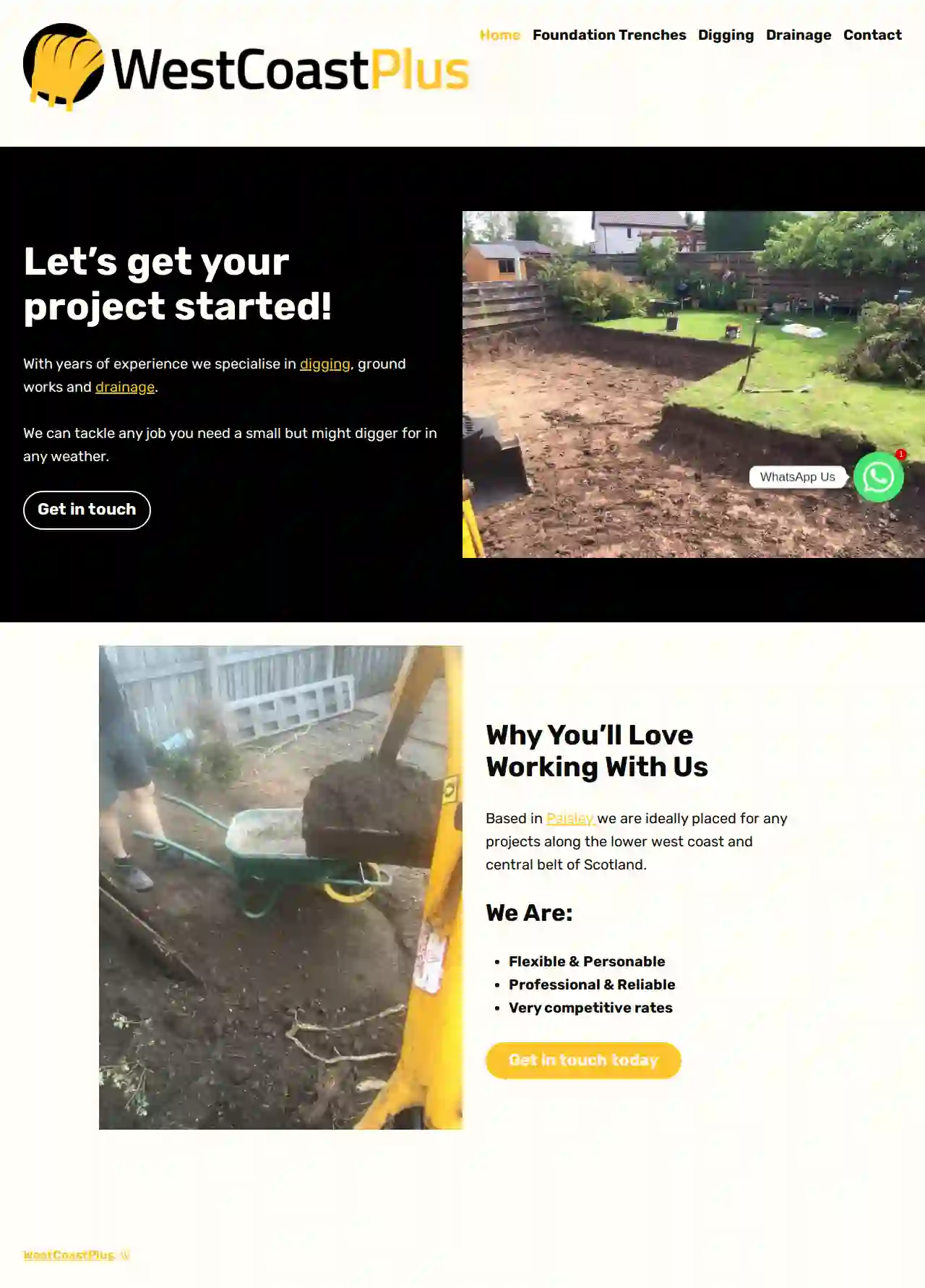Demolition Contractors Longton
Top Demolition Experts in Longton
Receive multiple Building Demolition quotes for your project today! Compare profiles, reviews, accreditations, portfolio, etc... and choose the best offer.

West Coast Plud
10/2 36 Moorfoot Ave, Paisley, PA2 8AG, GBWestCoastPlus: Your Trusted Partner for Digging, Groundworks, and Drainage WestCoastPlus is a well-established company with years of experience in digging, groundworks, and drainage. We are based in Paisley, Scotland, and are ideally located to serve projects across the central belt of Scotland. Our team is dedicated to providing high-quality services at competitive rates, ensuring your project is completed on time and within budget. We understand that every project is unique, and we take pride in our flexible and personable approach. We work closely with our clients to understand their needs and ensure their complete satisfaction. Our commitment to professionalism and reliability means you can trust us to deliver exceptional results. Whether you need a small excavation for a garden project or a large-scale drainage system, WestCoastPlus has the expertise and equipment to handle any job. We are equipped to work in all weather conditions, ensuring your project stays on track. Contact us today to discuss your project and let us help you get it started!
- Services
- Why Us?
- Our Team
- Gallery
Get Quote
Over 11,537+ Excavation Pros on our platform
Our excavation contractors operate in Longton and beyond!
ExcavationHQ has curated and vetted the Best Excavation Contractors in and around Longton. Find the most reliable contractor today.
Frequently Asked Questions About Demolition Contractors
- Dust Suppression: Use water spraying, misting systems, or other dust suppression techniques to control airborne particles.
- Noise Barriers: Erect temporary noise barriers around the demolition site to reduce noise transmission to nearby properties.
- Work Schedule: Schedule noisy demolition activities during permitted hours to minimize disturbance to neighbors.
- Communication: Keep neighbors informed about the demolition schedule and any potential disruptions.
- Recycling: Concrete, brick, metal, and wood can be recycled and reused in other construction projects, reducing waste sent to landfills.
- Landfill Disposal: Non-recyclable materials are disposed of in designated landfills according to local regulations.
- Donation: Some materials, such as fixtures or appliances, may be suitable for donation to charitable organizations.
- Waste Generation: Demolition generates a large volume of debris, contributing to landfill space and potentially releasing harmful substances into the environment if not disposed of properly.
- Air Pollution: Dust and particulate matter released during demolition can impact air quality, affecting human health and the environment.
- Noise Pollution: Demolition activities can generate significant noise, disturbing nearby residents and wildlife.
- Resource Depletion: Demolition consumes resources that could be salvaged and reused, contributing to resource depletion and environmental degradation.
What is the difference between demolition and deconstruction?
Demolition: Typically involves bringing down a structure quickly and efficiently, often using heavy machinery and potentially explosives. The primary goal is to clear the site.
Deconstruction: Focuses on carefully dismantling a building piece by piece to salvage reusable materials. It prioritizes minimizing waste and environmental impact, often involving manual labor and specialized tools.
The choice between demolition and deconstruction depends on the project's objectives, budget, and environmental considerations.
How can I minimize the dust and noise from demolition?
What happens to the debris after demolition?
What are the environmental impacts of demolition?
What is the difference between demolition and deconstruction?
Demolition: Typically involves bringing down a structure quickly and efficiently, often using heavy machinery and potentially explosives. The primary goal is to clear the site.
Deconstruction: Focuses on carefully dismantling a building piece by piece to salvage reusable materials. It prioritizes minimizing waste and environmental impact, often involving manual labor and specialized tools.
The choice between demolition and deconstruction depends on the project's objectives, budget, and environmental considerations.
How can I minimize the dust and noise from demolition?
- Dust Suppression: Use water spraying, misting systems, or other dust suppression techniques to control airborne particles.
- Noise Barriers: Erect temporary noise barriers around the demolition site to reduce noise transmission to nearby properties.
- Work Schedule: Schedule noisy demolition activities during permitted hours to minimize disturbance to neighbors.
- Communication: Keep neighbors informed about the demolition schedule and any potential disruptions.
What happens to the debris after demolition?
- Recycling: Concrete, brick, metal, and wood can be recycled and reused in other construction projects, reducing waste sent to landfills.
- Landfill Disposal: Non-recyclable materials are disposed of in designated landfills according to local regulations.
- Donation: Some materials, such as fixtures or appliances, may be suitable for donation to charitable organizations.
What are the environmental impacts of demolition?
- Waste Generation: Demolition generates a large volume of debris, contributing to landfill space and potentially releasing harmful substances into the environment if not disposed of properly.
- Air Pollution: Dust and particulate matter released during demolition can impact air quality, affecting human health and the environment.
- Noise Pollution: Demolition activities can generate significant noise, disturbing nearby residents and wildlife.
- Resource Depletion: Demolition consumes resources that could be salvaged and reused, contributing to resource depletion and environmental degradation.